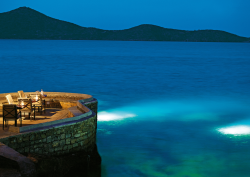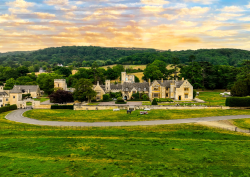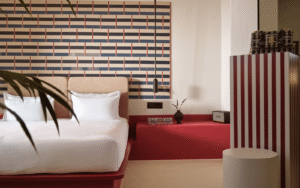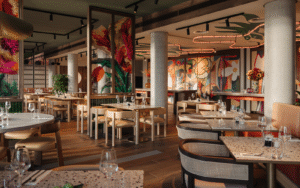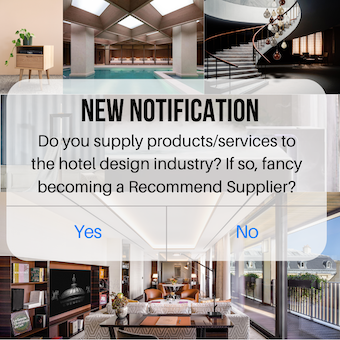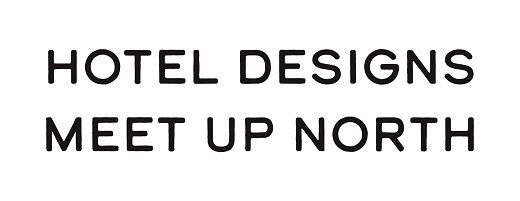Editor Hamish Kilburn checks in to review Meliá Frankfurt City, a hotel that is wrapped in an eco-smart building that shelters a sleek hospitality experience…
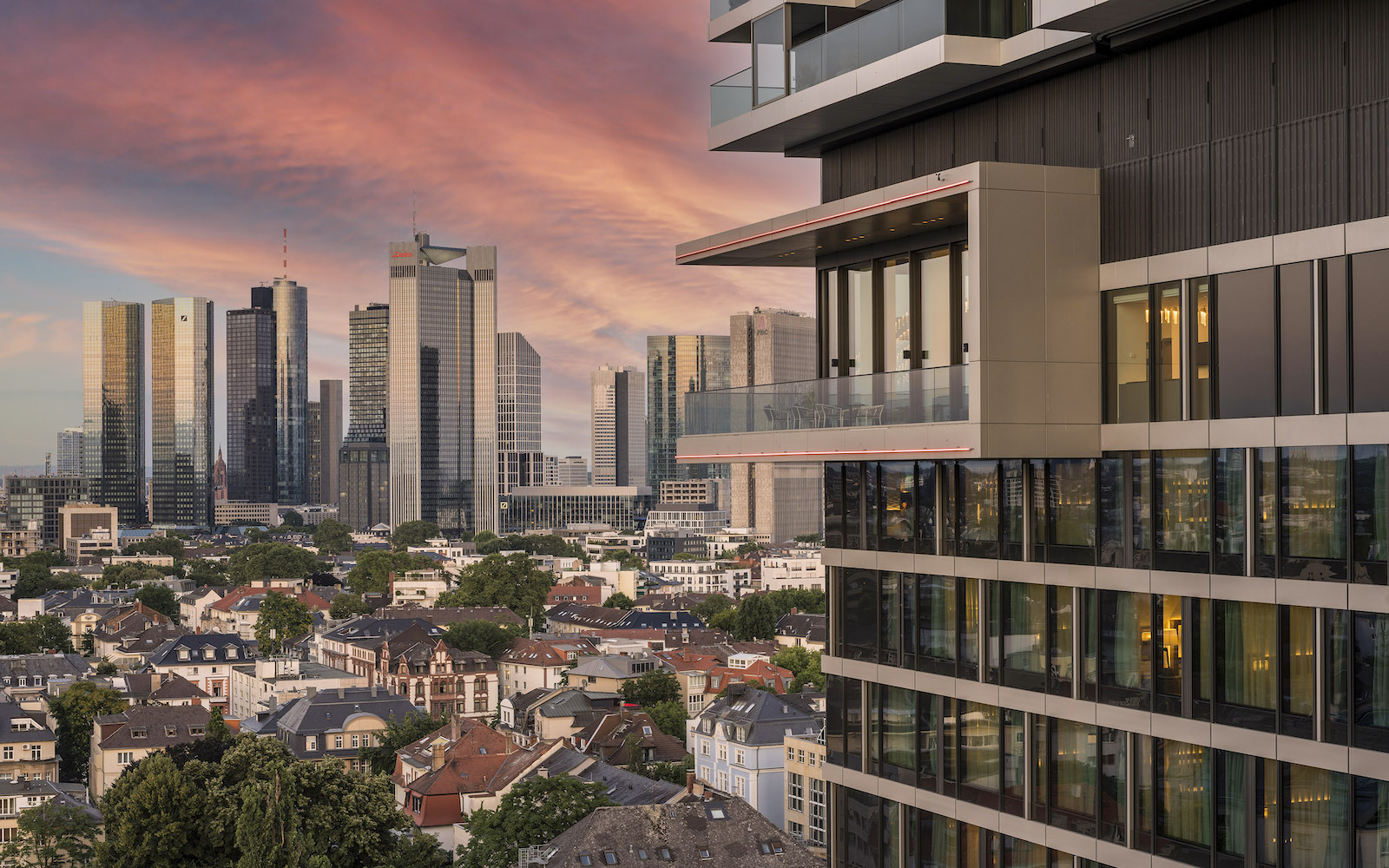
Business hotels have been given somewhat of a bad reputation in the past. The image of a ‘business hotel’ that many would conger up would often be one that looks and feels clinical; a design scheme that perhaps suffocates the opportunity for colour, texture, art and spaces as a whole to play and perform. “But hey, there’s strong wifi!”
Just like business travellers themselves, hotels that cater for MICE travellers in modern times don’t want to be stereotyped – nor do they deserve to be. Preconceptions are indeed there to be challenged, which is exactly what Meliá Frankfurt City – a 431-key hotel that unapologetically really means business – did in 2021, when it arrived to join some of its relatives in Germany’s fifth largest city, with effortless style.
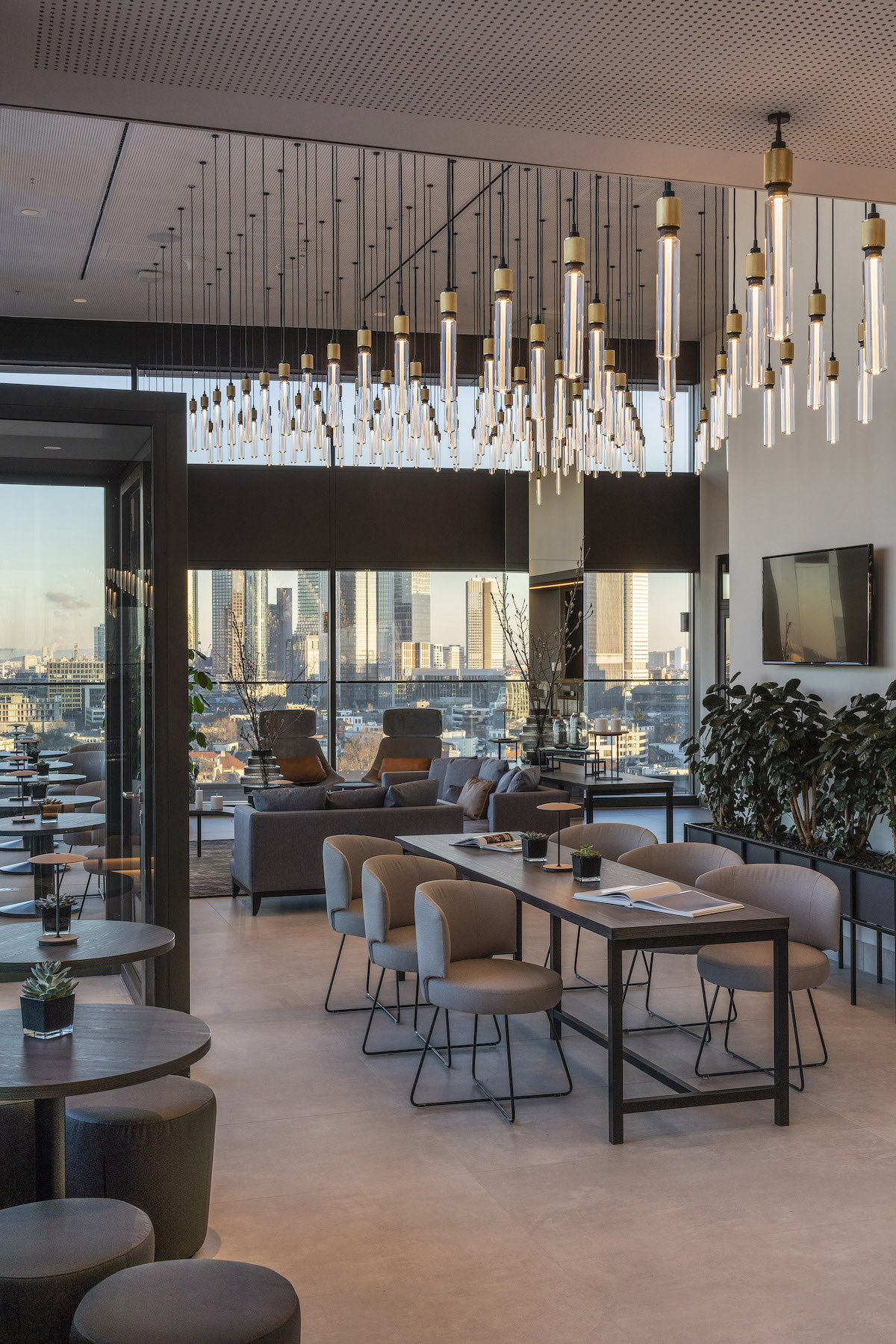
Image caption: Decorative lighting has been used to add a playful touch in the Level Lounge. | Image credit: Meliá Frankfurt City
Tasked to take design cues from the energy and culture of Frankfurt below – the economical heart of Germany, popular for its art, literary enthusiasts and cider, would you believe – Álvaro Sans of ASAH Studio, who has become the Meliá resident designer in recent years, and jonasplan collectively used the hotel’s statement architecture and its position in the city to evoke a paired-back, yet confident, design scheme that feels elevated in all the right areas. “It was and is one of the most challenging hotel projects in Frankfurt,” admitted Dirk Jonas, owner of jonasplan. “Meliá Hotel International’s vision to create a trendsetting business hotel combined with the building’s own architectural style was a satisfying hurdle to overcome as a designer.”
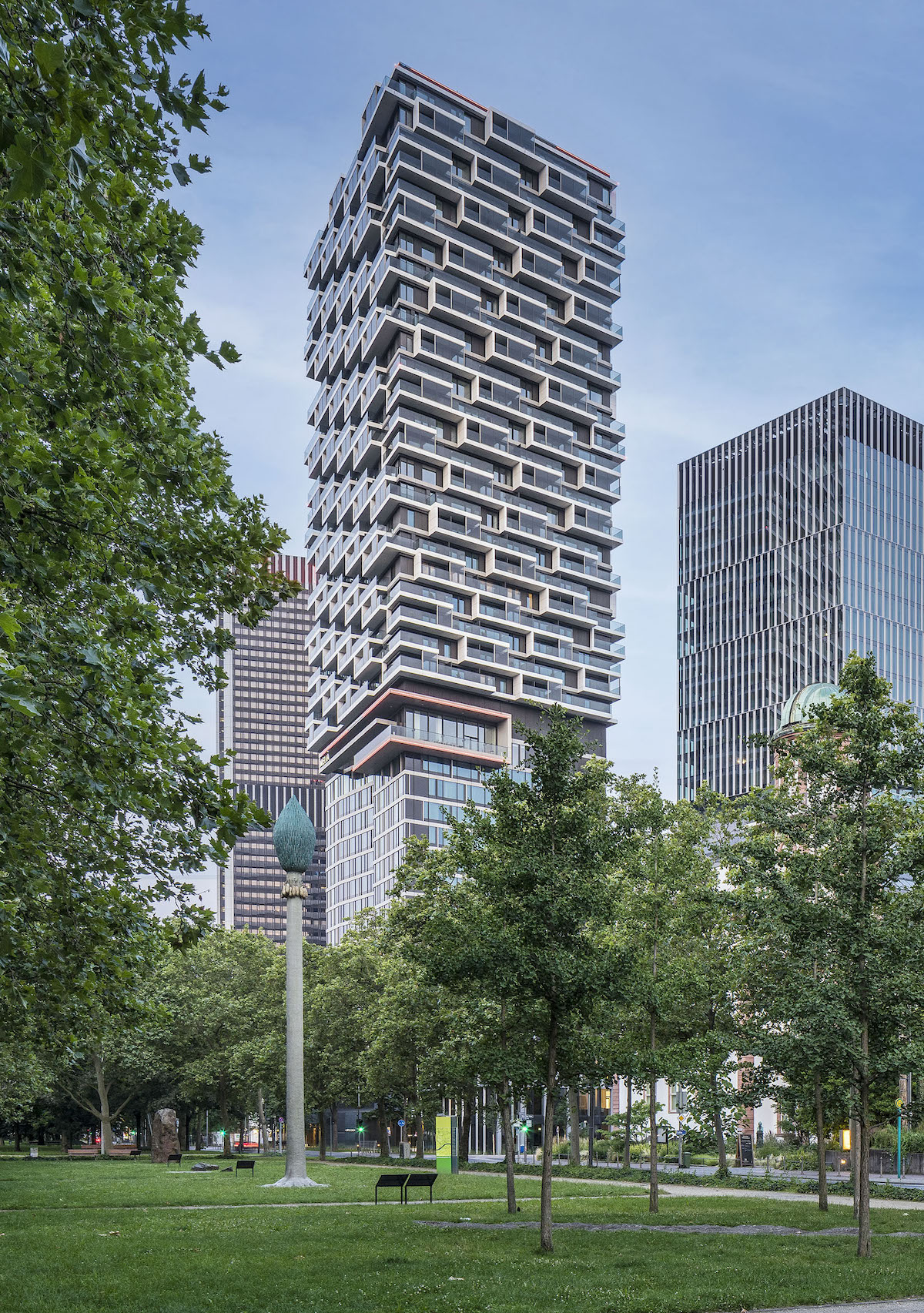
Image caption: The striking jenga-like building sits opposite the city’s financial district. | Image credit: Meliá Hotels International
Going against the grain – challenging conventional approaches in hotel design – does not need to be dramatic. It just requires a meaningful hook. For Melià, sky-high thinking resulted in the group pitching up in a new city skyscraper that commands the skyline. I’m told that Cyrus Moser Architects created the building’s façade to be a representation of a rose – personally, I got jenga for giants. What we can agree on, though, is the building’s eco rating. The innovative hotel is exactly that; smart and savvy with sophisticated and hidden energy system and a cutting-edge, self-regulating temperature concept. When guests open a window or a balcony door, for example, the air conditioning unit automatically shuts off to conserve energy. The building is constantly working, behind the scenes, to circulate clean air into all spaces, and its digital lifts make travelling from one level to another hassle-free.
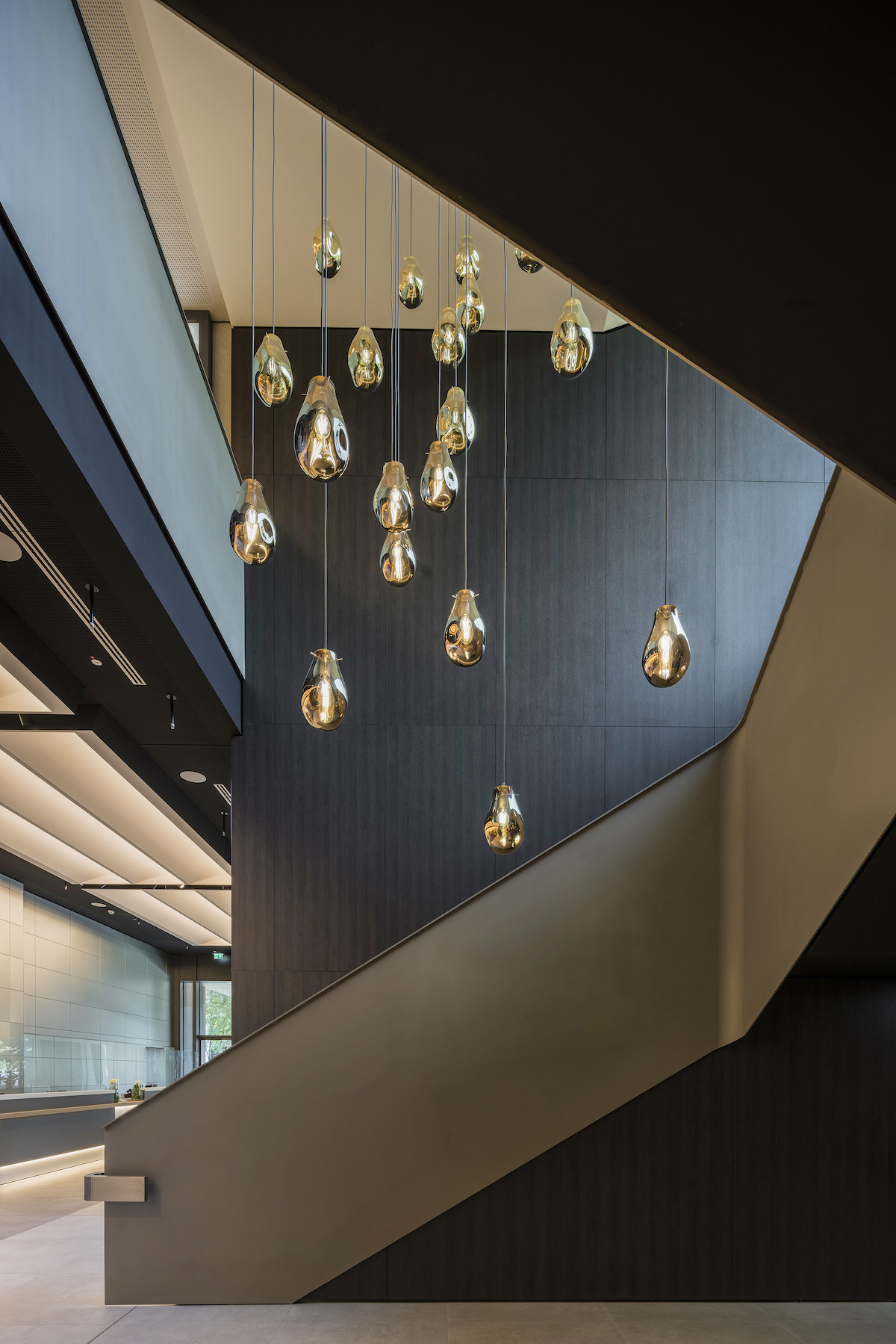
Image caption: A contemporary chandelier emphasises the ceiling height in the lobby. | Image credit: Meliá Hotels International
Arriving at Meliá Frankfurt City felt like a welcome home. The brand’s signature scent, which I also experienced at Hotel Colón Gran Meliá in Saville, encourages those checking in to take a deep breath in. The lobby’s minimalist design, under a double-height ceiling – emphasised by a striking chandelier of melted bulbs – is commanded by panelled lighting that is seamlessly layered with artefacts, doorstop-like books and pops of art dotted around the space, as well as indoor plants that grounds the whole interior design scheme. “It is a down-to-earth and impressive hotel, with the luxury of having enough space in each direction,” added Jonas. “This is the first impression the guest should get upon entering the lobby and all other areas. It demonstrates the hotel’s luxury – AKA space where guests can both relax and explore.” The ground floor is deliberately paired-back, with low-level seating that makes the start of the hospitality experience feel warm and inviting.
Connected to the free-flowing lobby, with street-level access, a light and bright all-day restaurant and bar that is designed for both guests and locals alike fills the open-plan ground floor with a sprinkle of energy. To create a more intimate setting, the designers have played with materials and lighting on the ceiling to create the apt illusion of a more compressed – I’d go as far to say more inviting – atmosphere.
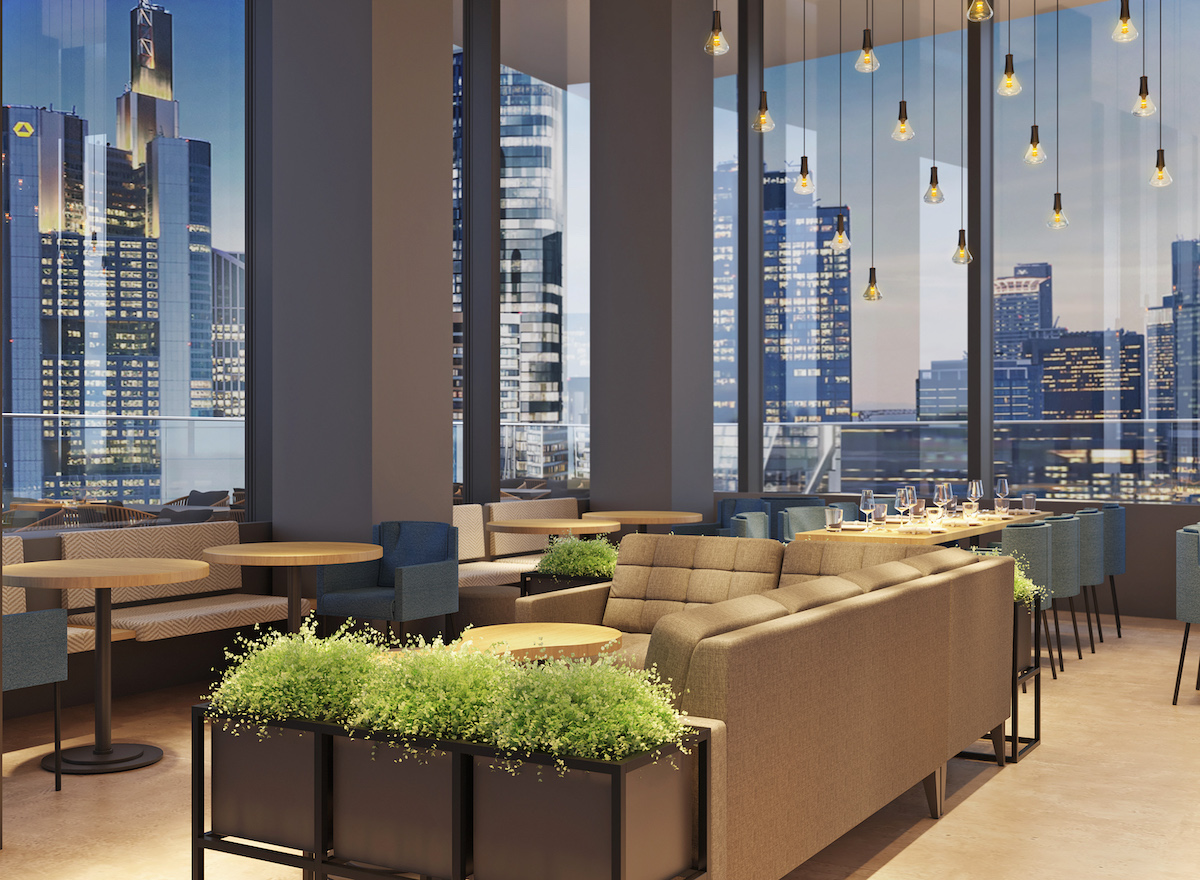
Image caption: For executive guests, the check-in experience takes place on the 15th floor, inside The Level Lounge. | Image credit: Meliá Hotels International
Everything about the hotel – from the floor-to-ceiling windows to the balcony views that stretch across the city and as far as the Tannus Mountains – encourage guests to look outside. The unique vantage point over the city frames a magnificent panorama of Frankfurt – it captures the juxtaposition of new and old architecture that the city blends faultlessly. For executive guests – guests staying in suites or who have achieved a Meliá Premium status with the group’s rewards incentive, the check-in experience takes place on the 15th Floor, in The Level Lounge, an exclusive area of the hotel that features plush furniture, soft lines and a artistic lighting scheme.
Adjacent to the executive area is arguably the hotel’s strongest asset: Oben, a popular destination restaurant and bar that serves Mediterranean dishes with a German twist. Its size – smaller than you might anticipate given its hype on the city’s hospitality scene – evokes a snug, cosy and exclusive experience. Personality has been injected with sharp accents of colour on a gallery wall of contemporary art, which are abstract interpretations of popular culture, by Nathali Von Kretschmann, to dominate the space. At night, the bar and restaurant evolves into a spirited hospitality hub – on some nights complete with a resident DJ.
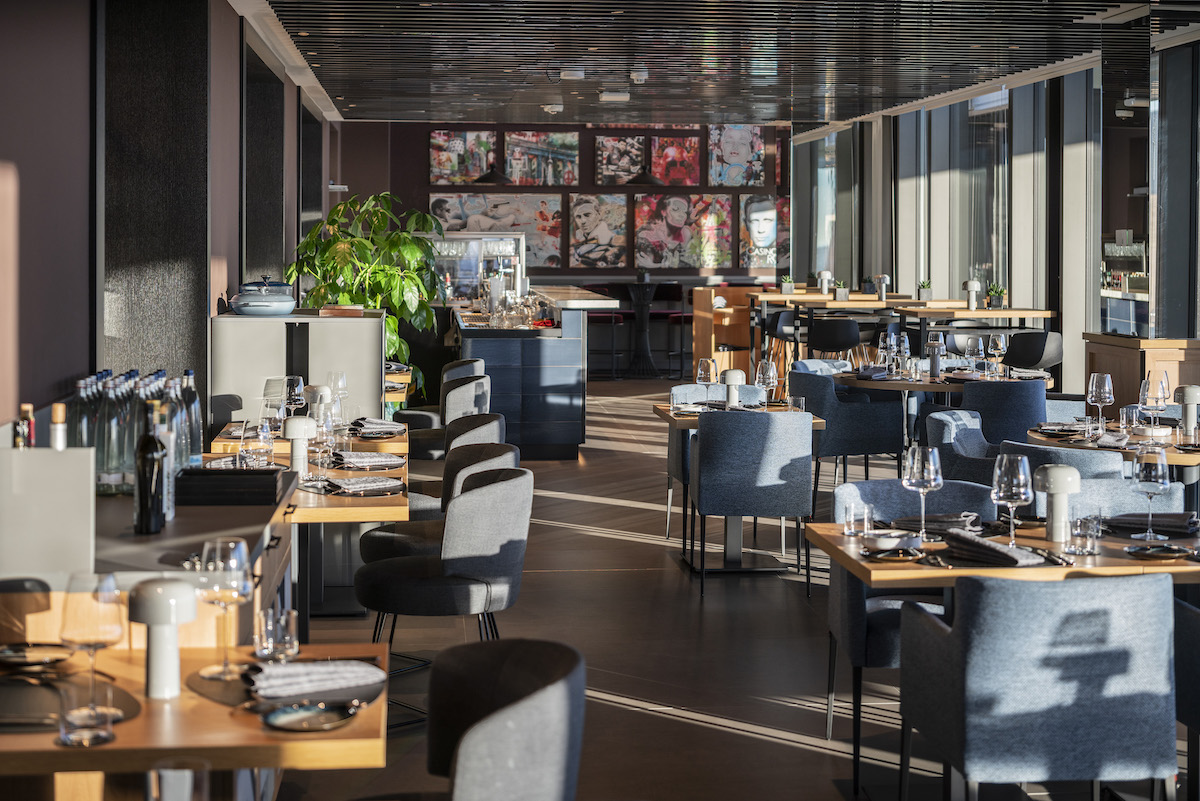
Image caption: Oben is the city’s new destination restaurant. | Image credit: Meliá Hotels International
The hotel shelters 431 rooms in total, which occupy the first 23 floors. Distinct to Meliá, the rooms are generous in size, and reflect an unfussy take on luxury design – think refined open space with a few hero moments, such as the textured headboard. The ensuite bathrooms, which include premium brands such as Villeroy & Boch, GROHE and Geberit, are connected to the bedrooms through sliding doors. “We wanted integrate the bathroom into the bedroom to avoid the impression of a limited space,” Jonas explains. “In turn, this also evokes a sense of value and quality.” These mini wellness spaces, some with deep, freestanding baths, feature high-pressured showers and customisable light schemes to work for any required ambiance. They feel more like sanctuaries than practical spaces.
-
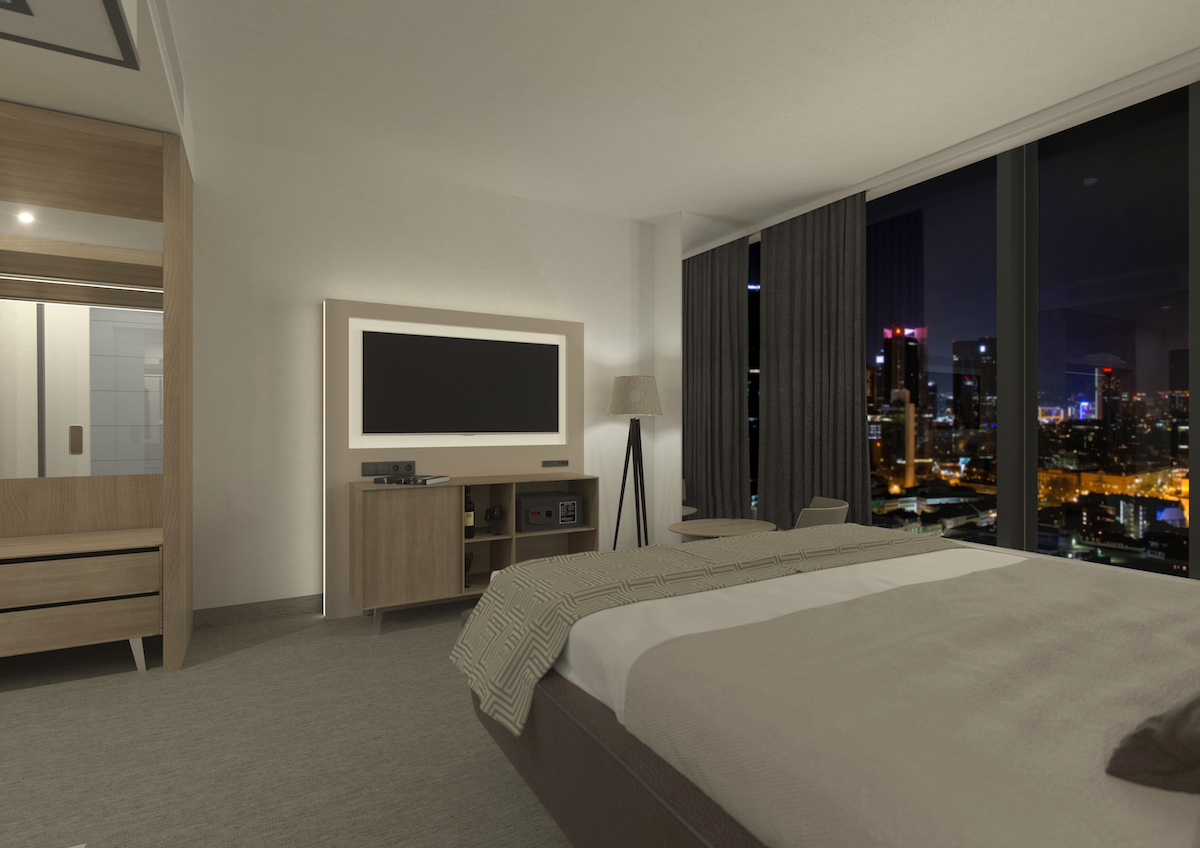
- Image caption: The large rooms feature hidden tech, with a deliberate lack of art, encouraging guests to look out of the floor-to-ceiling windows and balcony doors. | Image credit: Meliá Hotels International
-
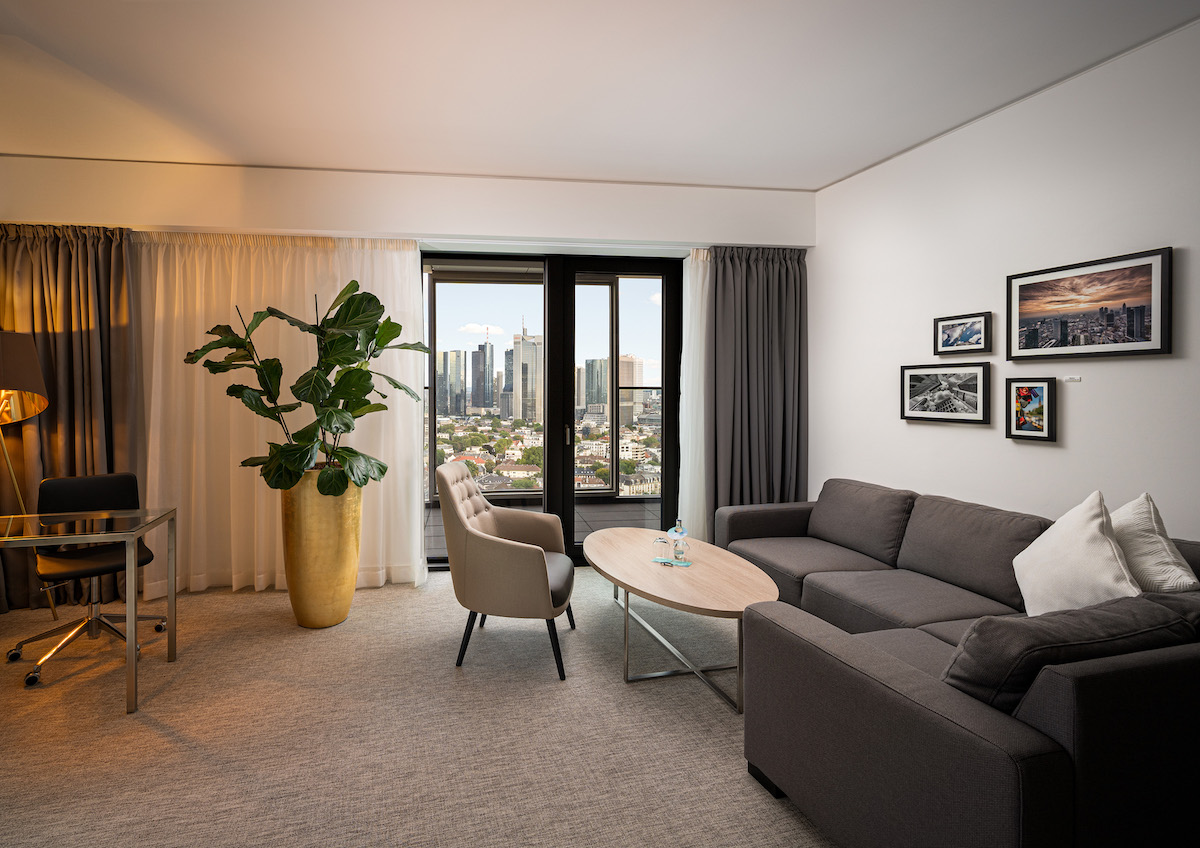
- Image caption: All 431 rooms and suites feature a contemporary, international design scheme and frame a striking perspective of Frankfurt. | Image credit: Meliá Hotels International
On the lower level, the hotel’s wellness and fitness area is complete with everything one might need on a business and/or leisure trip, including a fully equipped gym, a large glass-fronted sauna and outside break-out spaces that face the city. Here, lighting channels guests into a different space and mindset – and with it being located below the skyline, the lighting had to work even harder. “Everyone was clear that Germany and Frankfurt are not the typically ‘sunny’ locations – quite a lot of time in the year it is rainy, dark or cloudy,” the designer said. “This resulted in the lighting design taking a central role – the combination of interior and lighting design must distract and make guests forget. For example, at a sunny seaside location, you’d open the windows, the curtains and let sun and breeze in. That’s all you need. But in a large German city behind the windows you need this backdrop to compensate for the occasionally less sunny weather. That’s why interior design does not work without a qualified lighting concept.”
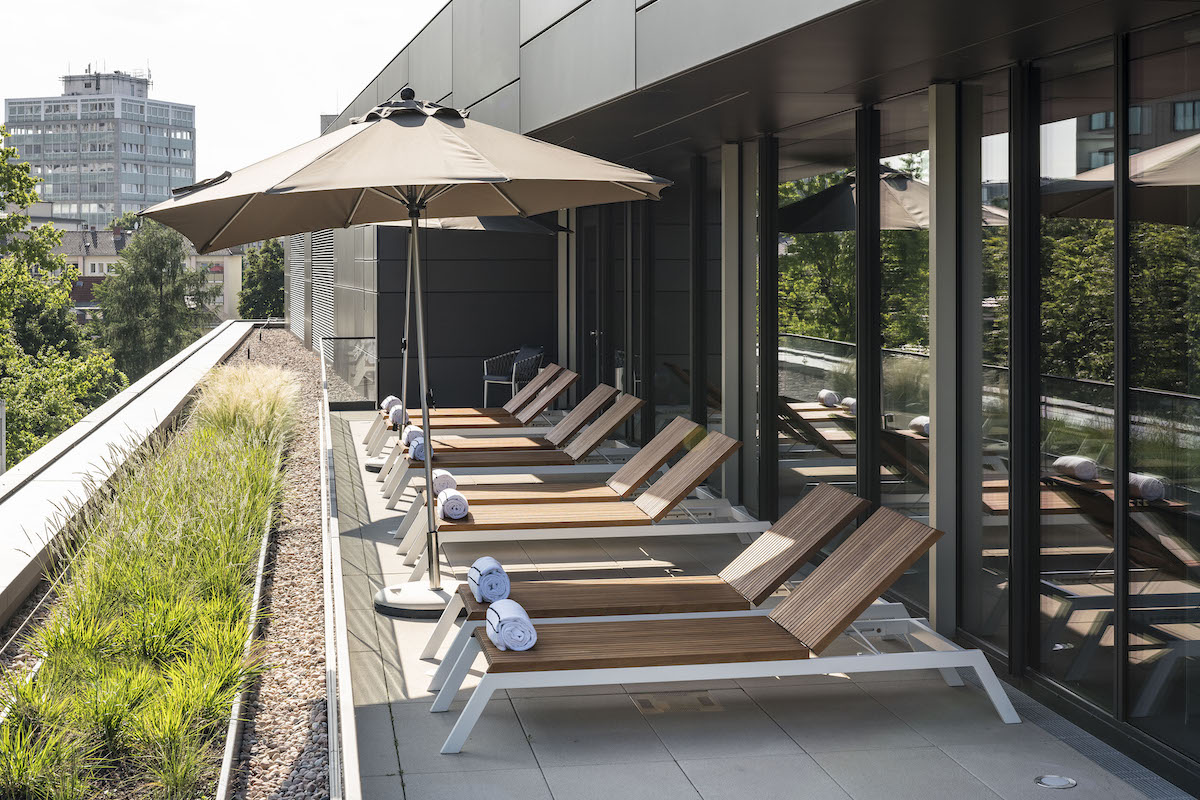
Image caption: The hotel has listened to modern traveller demands, with various break-out areas in-between the gym and the spa. | Image credit: Meliá Frankfurt City
For me, and Jonas it seems, the real impressions that the hotel leaves are the misconceptions it effortlessly challenges. “[While on site], we learned that Frankfurt is not like its reputation,” Jonas added. “Yes, it is big and awesome, but it is equally beautiful and charming. It’s a place to be and a real destination.”
Checking out of Meliá Frankfurt – having embraced juxtaposing architecture around the city, while also having understood how the destination has used design to reinvent itself over and over (look no further than the New Old Town, unveiled in 2018) – it feels like I have been given a crash-course in what a business hotel has become, since the pandemic, in a new era of hospitality and hotel design. Meliá describes itself as ‘leisure at heart, business in mind’. For Jonas it’s, and I quote, “exactly what we’ve designed here in Frankfurt”. Well, it’s not untrue.
Main image credit: Meliá Hotels International





